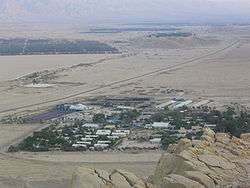Ketura, Israel
| Ketura קְטוּרָה | |
|---|---|
 | |
 Ketura | |
| Coordinates: 29°58′3.36″N 35°4′15.24″E / 29.9676000°N 35.0709000°ECoordinates: 29°58′3.36″N 35°4′15.24″E / 29.9676000°N 35.0709000°E | |
| District | Southern |
| Council | Hevel Eilot |
| Affiliation | Kibbutz Movement |
| Founded | November 1973 |
| Founded by | American immigrants |
| Population (2015)[1] | 485 |
| Website | www.ketura.org.il |
Ketura (Hebrew: קְטוּרָה) is a kibbutz in southern Israel. Located north of Eilat in the Arabah valley, it falls under the jurisdiction of Hevel Eilot Regional Council. In 2015 it had a population of 485.
History
Ketura was founded in November 1973 by a group of young Americans, most of whom had graduated the Young Judaea Year Course in Israel program within the previous decade. Its name was taken from a nearby hill and wadi, and is also the name of the second wife of Abraham (Genesis 25:1). Difficulties in the early years frustrated many of the inhabitants of the kibbutz, which caused many of the founders to leave. At the same time, more Young Judaeans joined the community, along with a variety of other immigrants as well as Israel Boy and Girl Scouts Federation graduates.
Tradition
Ketura is unique among kibbutzim for its religious pluralism. Although the kibbutz is not considered a religious kibbutz, Kashrut and Shabbat are observed in the dining room, public areas, and at social and cultural events, and there is a functioning congregation-led synagogue. The population of the kibbutz is composed of observant, masorati, and secular members, an unusual situation for a kibbutz. Ketura received the Speaker of the Knesset Prize for religious tolerance as a result of its religious progressiveness.
Economy
Agricultural enterprises of the kibbutz include a date orchard. The kibbutz is most well known for its guest house and educational seminar center — Keren Kolot — and its partnership in the local algae factory, Algatech, which processes haematococcus algae through a filtration system in order to extract natural astaxanthin. The extract is then sold around the world as a natural ingredient and pigment for use in cosmetics; and as a nutraceutical. Ketura is also a partner in the Arava Power Company (APC), producing electricity from solar panels. There is one 4.95MW field on the kibbutz, Ketura Sun, with a second 40MW field opened in 2015, then the largest in Israel.[2]
Economic cooperation with other kibbutzim in the area includes a regional date-packing plant and Ardag, a large fish hatchery near Eilat. Many members work outside the kibbutz in professional positions such as teachers, physical therapists, social workers, and more. Ketura also offers accounting and bookkeeping services, with many members working in these positions.
Environmentalism
Ketura is part of the Green Kibbutz movement. In addition to promoting awareness, recycling, and operating a second hand store, Ketura has also experimented with other environmental projects such as a community garden. It has pioneered many new ecologically sounder practices and adopted more common environmentally friendly habits. Members of Ketura founded the Arava Institute for Environmental Studies (AIES), which is located at Ketura. The institute promotes regional cooperation between Israelis, Palestinians, and residents of other neighbouring Arab countries in environmental matters. It also researches and draws attention to ecological problems in the region and researches the desert ecosystem.
The only surviving example of the Judean Date Palm, artificially germinated from 2,000-year-old seeds discovered in archaeological excavations, was planted in Ketura and continues to survive there.
References
- ↑ "List of localities, in Alphabetical order" (PDF). Israel Central Bureau of Statistics. Retrieved 16 October 2016.
- ↑ Israel's largest solar field begins flowing to the national grid The Jerusalem Post, 29 July 2015
External links
| Wikimedia Commons has media related to Ketura. |
- Official website
- Ketura Kibbutz Program Center
- Hadassah Medical Organization
- Arava Institute for Environmental Studies